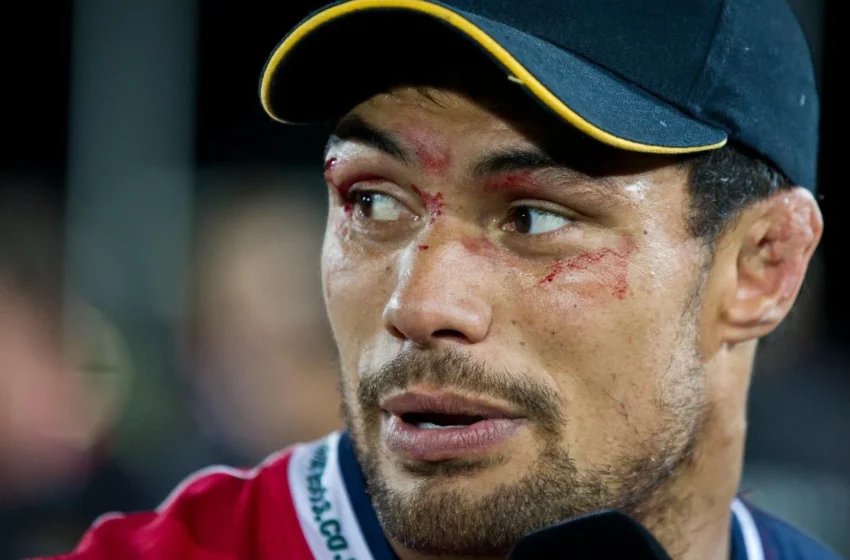Who is Shane Christie? A look at his career and legacy

Who is Shane Christie? A look at his career and legacy
The New Zealand rugby community is in mourning following the death of former Māori All Black and Highlanders flanker Shane Christie, who has passed away at the age of 39.
Christie died on Wednesday morning in circumstances understood to be linked to his long struggle with concussion-related health problems. His loss has sent shockwaves through rugby circles, where he was regarded not only as a tough competitor but also as a thoughtful leader and mentor who continued to give back to the game after his playing career was cut short.
A respected leader on the field
Born in Nelson, Christie carved out an impressive playing career that spanned provincial, Super Rugby and representative honours. Between 2010 and 2016, he became a cornerstone of the Tasman Mako side, making 73 appearances and captaining them to the 2013 Championship title in the National Provincial Championship. His leadership was seen as central to the cultural foundations that helped transform Tasman into a force, culminating in Premiership success in later years.
At Super Rugby level, Christie played 29 matches for the Highlanders between 2014 and 2017, co-captaining the side in 2016 alongside Ben Smith. He was remembered as a relentless competitor with a natural ability to inspire teammates. He also earned eight caps for the Māori All Blacks and represented New Zealand in the All Blacks Sevens programme. A brief stint with the Crusaders in 2013 rounded off his professional playing résumé.
Career cut short by concussion
Christie’s playing career ended abruptly in 2017, following a succession of concussions that left him with ongoing symptoms. In interviews, he described suffering memory lapses, speech problems, blurred vision, persistent headaches and mood swings. These symptoms, he feared, aligned with Chronic Traumatic Encephalopathy (CTE), a degenerative brain disease linked to repeated head trauma.
In a candid interview, Christie revealed that during the 2016 Super Rugby season he experienced three or four concussions within six weeks. At times he played matches on “autopilot”, later struggling to recall key details of games. The impact was not only physical but emotional, as he grappled with the frustration of living with an invisible, progressive condition.
From player to coach and mentor
Despite retiring from playing, Christie remained determined to contribute to rugby. He transitioned into coaching, first with Tasman, where he played a pivotal role in guiding the team to back-to-back Premiership titles in 2019 and 2020. His commitment to the growth of the women’s game was equally significant, as he worked within Tasman’s Farah Palmer Cup programme.
At Super Rugby level, he returned to the Highlanders as defence coach for the 2021 and 2022 campaigns. Former colleagues praised his attention to detail and passion for mentoring players, though Christie later spoke openly about the challenges of balancing coaching duties with the lingering effects of concussion.
An advocate for player welfare
Perhaps Christie’s most enduring legacy lies in his advocacy for player welfare and concussion awareness. The 2023 death of his former Tasman team-mate Billy Guyton, later confirmed to have been suffering from CTE, struck Christie deeply. He spoke at Guyton’s funeral and soon after helped establish the Billy Guyton Foundation in Nelson, pushing for greater research and transparency around head injuries in rugby.
Christie pledged to donate his brain to the New Zealand Sports Human Brain Bank, joining Guyton in contributing to vital research aimed at understanding the progression and prevalence of CTE among athletes. His courage in sharing his struggles publicly helped shed light on the risks of repeated head trauma, in a sport where players have historically downplayed injuries.
Tributes from across rugby
New Zealand Rugby expressed its sorrow in a statement, honouring Christie’s dedication both as a player and coach:
“Any time the rugby community loses a member it is felt deeply. Shane’s passion for the game will be remembered always. Our thoughts are with his whānau, friends, and community.”
The Tasman Mako hailed him as a “true legend” who laid the cultural foundations for the side’s later success, while the Highlanders described him as a “relentless competitor and natural leader” whose impact extended beyond the pitch.
Friends and colleagues also spoke of a generous and caring individual who prioritised the wellbeing of those around him. Nelson lawyer Craig Morice, a close friend, described Christie as “an incredibly nice, caring person” whose death leaves “a huge void” for family, friends and teammates.
A legacy beyond rugby
Christie’s passing highlights the urgent and ongoing conversation around concussion in contact sports. His willingness to speak openly about his health challenges has already influenced a generation of players and coaches, encouraging greater honesty and responsibility in managing head injuries.
Though his life was tragically short, Christie leaves behind a legacy that extends far beyond the number of games he played. He will be remembered not just as a Māori All Black, a Highlanders captain, or a Tasman great, but as someone who confronted the darker side of rugby with honesty and courage.
Moe mai rā, Shane Christie.

